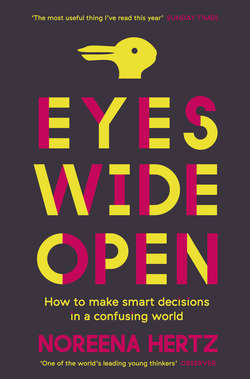Читать книгу Eyes Wide Open: How to Make Smart Decisions in a Confusing World - Noreena Hertz - Страница 44
From Alan Greenspan to Bernie Madoff
ОглавлениеIf so …
What about the financial crisis?
It’s really quite absurd, when we reflect on it now, how much trust was put in the hands of those who were considered ‘experts’ in the world of finance. But it was.
From rating agencies to economists, from Alan Greenspan to Bernie Madoff, the proclamations of those deemed experts were taken at face value. On the rare occasions that they were challenged, the very few who dared to do so were ignored or even fired.
So, investments as poor or risky as Icelandic banks and mortgage-backed securities were A-rated by Moody’s and Standard & Poor’s, and therefore deemed safe to buy and sell, without anything like the appropriate caveats or enquiry, simply because these supposedly ‘expert’ agencies had given them the stamp of approval.
Equally shockingly, sophisticated investors like Banco Santander and Bank Medici invested in a fund that promised a steady return of over 10 per cent, despite the near-impossibility that anyone could deliver such steady performance, simply because of the faith they put in one man – Bernie Madoff.
Meanwhile, economic mavens such as Alan Greenspan and Larry Summers sang the praise of derivatives – Greenspan actually claimed that they made the global system less risky – despite a whole host of warnings on their dangers.17 And fellow economists claimed that a bankruptcy like that of Lehmann Brothers could be expected only once every billion years, even though similarly ‘impossible’ events, such as the collapse of the LTCM hedge fund and the 1987 stock-market crash, had occurred twice in the previous fifteen years.18
Experts were taken at face value simply because they were perceived as being expert.
If only those oh-so-smart economists, with their oh-so-slick theories about the efficiency of markets and the rationality of those who inhabit them, had been properly interrogated. If only those financial gurus – whether Alan Greenspan, former Chairman of the US Federal Reserve, with his endless proclamations about the safety of the financial system, or Bernie Madoff, fund manager extraordinaire, with his promises of steady returns of over 10 per cent – had been viewed as fallible humans, rather than haloed mavens. If only the rating agencies, Standard & Poor’s, Fitch and Moody’s, had been seen for what they were – conflicted organisations, ill suited to objectively assess hyper-complicated situations – and then been treated with appropriate scepticism.
If only all the supposed experts had been challenged, and the dissenting views at least been considered. There were even some hedge funds before the crisis, big names such as Paulson & Co. and Lansdowne Partners, who were ‘short the market’, thereby signalling that they thought we were heading for a fall. Yet, as one of the principals pointed out to me, no one ever asked them why they were thinking differently from most others in the market, and had taken such a position.
And if only experts in the worlds of finance and economics weren’t so prone to move in packs, and dissenters weren’t so often sidelined, then a vast edifice of flawed models, regulatory prescriptions and computer simulations would never have been established; Park Avenue dowagers, Holocaust survivors and ordinary taxpayers would not have faced financial ruin; and the world would not have been plunged in to a far-reaching financial maelstrom.
Let me get something clear here. It’s not as if experts have not powerfully contributed to our world and our knowledge. Of course they have, and they continue to do so. Nor am I suggesting that years of training, technical skill and deep immersion in a particular area count for nought – of course these things matter. What I am saying is that the conflation of expert with unchallengeable guru, experience with accolades, scientists with exemplary scientific method, and claims of certainty with actual veracity, puts us in peril.
I’m saying this not only as someone who has had to deal with experts a lot in my private life, but also – and I’m aware of the irony here – as an ‘expert’ myself. A professor, someone who advises prime ministers, heads of big companies and international organisations like the World Bank.
But I am an expert who thinks not only that others must be more challenging of us, but also that as a group we need to change. We need to be more open to people challenging our points of view, more accepting of uncertainty and the limits of what we can know. And we need to be more willing to admit to our own limitations.
For while there are of course many exceptions – wonderful, civilisation-enhancing exceptions – experts can be both flawed and biased.
I mean, they’re human, after all.
